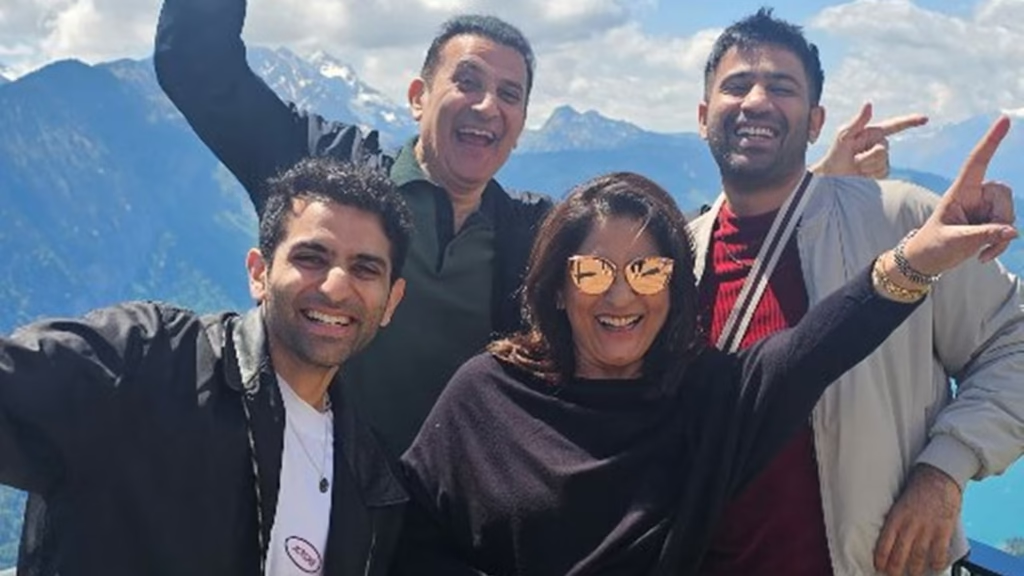In a world where everything from shopping to travel bookings happens with a click, it’s easy to fall prey to online scams — even for celebrities. The ever-graceful Archana Puran Singh, a beloved face on Indian television, recently experienced this harsh reality when her much-anticipated Dubai trip took an unexpected and deeply unpleasant turn.
While fans often look up to their favorite stars for lifestyle inspiration, this time, Archana’s unfortunate travel mishap serves as a cautionary tale for everyone. In the age of digital convenience, fraudsters are becoming smarter and more convincing, leaving even seasoned personalities vulnerable.
Let’s take a closer look at what happened to Archana, how online travel scams operate, and most importantly, how you can protect yourself and your loved ones while booking trips online.

A Dream Holiday Gone Wrong
Archana Puran Singh had planned a relaxing getaway to Dubai — a city known for its glittering skyline, luxury shopping, and cultural attractions. What should have been a delightful break turned into a nightmare when she realized she had been duped by a fake travel website posing as a legitimate airline ticketing platform.
She booked what appeared to be a genuine flight, made the payment, and received a confirmation email that seemed perfectly professional. However, upon arriving at the airport, she was shocked to discover that her booking didn’t exist in the airline’s system.

What followed was a stressful and disheartening experience — trying to trace the payment, contacting customer service numbers that either didn’t exist or didn’t work, and realizing that the website had vanished without a trace. Despite being a public figure, Archana too found herself helpless against the rising wave of online travel scams.
How Do Online Travel Frauds Happen?
Online travel scams come in many deceptive forms, targeting not just ordinary travelers but also celebrities and corporate clients. These scams often involve:
- Fake websites mimicking well-known airlines or travel portals, complete with professional-looking logos, terms, and payment gateways.
- Too-good-to-be-true deals on flights, hotels, or packages that lure unsuspecting customers into making hasty decisions.
- Social media ads and pop-ups promoting exclusive discounts that redirect users to fraudulent platforms.
- Phishing emails that look like official communication from reputed airlines, asking users to confirm or update booking details.

Once a traveler makes a booking, they either receive fake e-tickets or confirmations. When the traveler attempts to use these services, they realize the fraud only too late — and by then, the money’s gone, and the scammers have disappeared.
Why Are People Falling for These Scams?
The growing sophistication of digital scams makes them difficult to detect at first glance. Here are a few reasons why even cautious, tech-savvy individuals fall for these traps:
- Authentic-looking websites and emails that replicate the branding, design, and language of legitimate companies.
- Limited-time offers and discounts that pressure people into making impulsive decisions.
- Unsecured networks and devices where personal and financial details are more easily compromised.
- Lack of awareness about the latest scam tactics in the travel industry.
Archana’s experience is proof that no one is entirely immune, especially when fraudsters leverage advanced technology and psychological tricks to deceive people.
How Archana Handled the Situation
After realizing she had been scammed, Archana Puran Singh took to social media to share her ordeal. While visibly upset, she urged her followers to be extra cautious when booking travel online. She emphasized the importance of verifying websites, checking official contact numbers, and avoiding offers that seem too tempting.
Her openness about the incident helped shed light on a growing issue and sparked conversations about online travel safety among her fan community. Though she eventually managed to make alternate arrangements for her trip, the financial loss and emotional stress were significant.
Signs of a Fake Travel Website
Recognizing the red flags can prevent you from falling victim to such scams. Here’s what to watch out for:
- Unsecured website URLs: Always check for the ‘https’ in the web address. Secure sites begin with ‘https’, not ‘http’.
- Poor grammar or spelling mistakes: Authentic websites maintain professional content standards.
- No customer service contact details: Fake sites often have invalid phone numbers or email addresses.
- Limited payment options: Be wary if a site only accepts wire transfers, digital wallets, or cryptocurrency.
- No official app presence: Established travel companies usually have verified apps on official app stores.
- Suspiciously low prices: If an offer sounds too good to be true, it probably is.
Tips to Protect Yourself From Travel Scams
Archana’s ordeal is a reminder for everyone to stay vigilant when making travel bookings online. Here are practical steps to ensure a safe and secure travel planning experience:
1. Book Directly From Official Websites or Trusted Agents
Whenever possible, book tickets directly from an airline’s official website or through a trusted travel agent. If using a third-party platform, ensure it’s a well-known, verified business with a solid reputation.
2. Verify Website Authenticity
Before making any payments, check the URL carefully. Look for ‘https’ and confirm that the website name matches the official brand. Avoid clicking on pop-up ads or unfamiliar links, even if they appear on social media.
3. Use Secure Payment Methods
Always use secure, traceable payment options like credit cards or well-established digital wallets that offer consumer protection. Avoid wire transfers or direct bank deposits to unknown entities.
4. Cross-Check Booking Confirmations
Once you receive a booking confirmation, cross-check it with the airline or hotel directly through their official customer service. This helps verify your booking details early and prevents last-minute surprises.
5. Stay Informed About Common Scams
Keep yourself updated about the latest scam techniques in the travel industry. Follow travel blogs, online safety portals, or even credible influencers who share awareness posts, just as Archana did after her experience.
6. Enable Two-Factor Authentication
For added security, enable two-factor authentication on email accounts and apps associated with your travel bookings. This helps protect your personal and payment details from being easily hacked.
7. Avoid Sharing Personal Information Carelessly
Never share sensitive personal or financial information over unsolicited calls, emails, or messages. Legitimate travel companies will never ask for your OTPs, passwords, or full card details over the phone.
8. Keep Backup Plans Ready
Always have a plan B when traveling, especially internationally. Keep emergency contact numbers, travel insurance, and copies of essential documents handy.

What Archana’s Experience Teaches Us
While it’s heartbreaking to see someone’s dream trip turn sour, Archana Puran Singh’s unfortunate experience holds valuable lessons for everyone. It highlights how easily even public personalities can become targets of cybercrime and the importance of digital literacy in today’s hyper-connected world.
Her honesty in sharing the ordeal allowed her to warn countless fans, potentially saving them from similar traps. More importantly, it normalizes the conversation around online frauds — reminding us that falling victim to a scam isn’t a personal failure but a systemic issue demanding collective awareness.
A Cautionary Tale for All Travelers
With the rise in online bookings, travel-related scams are expected to increase, especially around holiday seasons and major events. Cybercriminals exploit the excitement and urgency that comes with planning a vacation, using fake offers and counterfeit platforms to trap unsuspecting victims.
Archana’s ordeal is a timely reminder that no matter how busy, famous, or experienced we are, vigilance is non-negotiable. Being cautious doesn’t ruin the spontaneity of travel — it preserves it.
In Conclusion
Online convenience comes with its own set of risks. As digital scams evolve, so should our awareness. Archana Puran Singh’s Dubai misadventure may have started on a bitter note, but it ends with a powerful lesson for everyone booking trips in the digital age.
Before you confirm your next flight or hotel booking, pause for a moment. Double-check the source, cross-verify your details, and remember that sometimes it’s better to pay a little more for peace of mind than to chase deals that cost you more than just money.
Travel should be about experiences, not regrets. Stay alert, book smart, and let your vacations remain the joyful escapes they’re meant to be.
Do follow UAE Stories on Instagram
From Jharkhand To Dubai: Tribal Traditions Shine Bright On Global Stage















